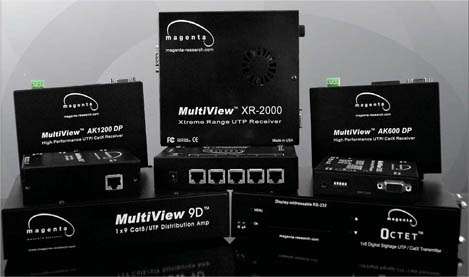Looking Ahead

With An Eye On The Future, Magenta Research Founder Keith Mortensen Built A Business On New Technological Horizons
SCN: Your career has kept you at the leading edge of technology development. Can you recall a childhood “eureka” moment when you discovered your knack for invention?
Keith Mortensen: I was in the fourth grade when I found a book called The Boy Electrician, written in 1912. It had plans for building a spark gap transmitter, which I did. Talk about broadband—it wiped out everything from the AM broadcast band through UHF TV! I was not very popular with the neighbors. It didn’t transmit very far, so I figured I more power was a necessity. Then I built my first Tesla coil...
SCN: You’ve been influential in the development of numerous patents and new technologies in areas ranging from semiconductors and medical imaging early in your career to video over Cat-5 and digital signage following your founding of Magenta Research in 1998. What is your advice for the next generation of engineers seeking to create new categories?
KM: Be technically agile, and don’t try to think too far off in the future. Particularly relevant to young companies in a rapidly evolving industry is to envision solutions that can be brought to market quickly to ensure a revenue stream to fund more and more complex developments and technical experimentation. Innovative technology alone without a sound business plan rarely succeeds, and vice versa.
SCN: Your original vision in founding Magenta Research was to serve the “financial market data” industry with KVM technology. But the company quickly migrated its technology to fill a perceived void in the fledgling digital signage market. In terms of agility, how does the AV systems industry compare to the others you’ve worked in?
KM: The trading floor industry was relatively stagnant from a growth perspective. In other words, the number of “new seats per year” as we referred to them, was flat. We started to look to other market areas with high growth rates that could benefit from our technology. The professional AV industry looked like a perfect fit given that LCD displays were going to soon flood the industry.
A daily selection of the top stories for AV integrators, resellers and consultants. Sign up below.
The semiconductor capital equipment industry was very different. It took ten years and hundreds of millions of dollars to develop the next generation lithography tool. It often necessitated developing new materials with which to manufacture components from. While I’ve been out of that industry for a while, I believe the next generation of lithography tools will run about $40 million a piece. It is a very different beast from the AV industry.
The Magenta Research MultiView Series. and market perspective. Audio, video, distribution, extension, hardware, software, services, integration, digital, analog, IT, education, corporate, retail, consumer, etc., etc. You get the idea.
SCN: How would you complete the following sentences?
True innovation is founded in... Requirement. While different sources give different people credit for the quote “Necessity is the mother of invention,” I believe it was Plato that originated the thought, and it truly does apply here. I think a close second would be “simplification”. There is unlimited opportunity in finding more cost effective and simpler solutions to everything.
When looking to the future, don’t forget... to “ignore the past” and pay no heed to self-proclaimed oracles and seers. This will taint and narrow your creativity. Rarely do humans get the future right when predicting future technology. In the late 40s and into the 50s, people predicted automobiles would have long been obsolete by “Atomic” powered vehicles, and we would all be flying around like George Jetson. It is impossible to predict technology within a time frame because new technologies are born of other technologies and material sciences that may not exist yet.
Stay ahead of the curve by... adopting a simple philosophy of “every task, no matter how small, should be treated with a sense of urgency”. This sense of urgency applies to every aspect business, not just technological innovation. It is the corporate culture at Magenta, and extends from the “mechanics” of order entry, finance and production to shipping and receiving, and the “creative” aspect of sales, marketing, engineering, and development. Science, art and good business hygiene all require the same sense of urgency in order to stay ahead.
